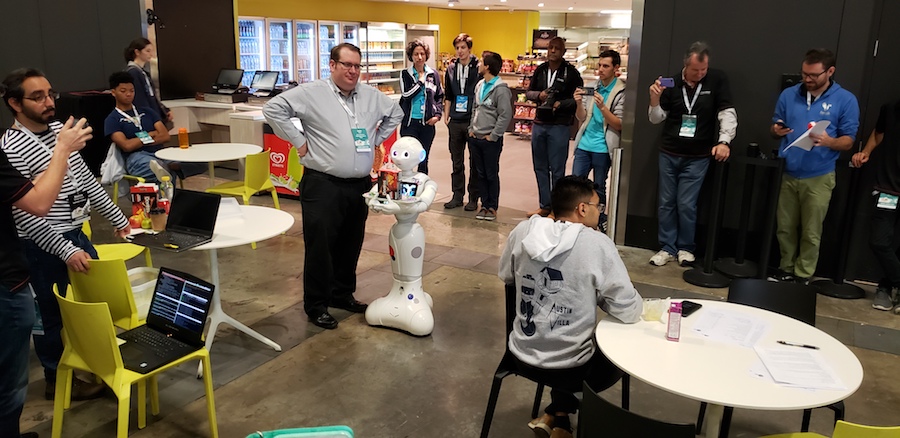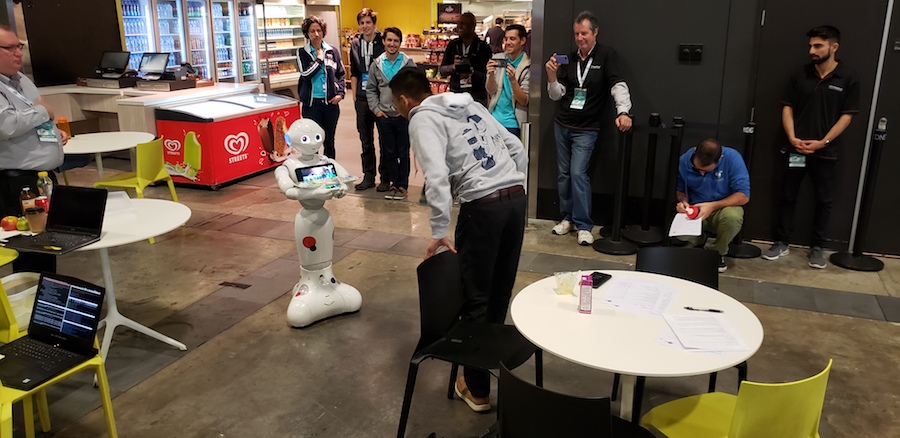
ΑΙhub.org
#RoboCup2019 @Home – 2nd round
After three test blocks, about half of the teams in all three sub-leagues advanced to the 2nd round of the competition.
One new challenge in this second round involved a restaurant task. In this task, the robots left their controlled environments in the @Home arena and took over the restaurant at the venue. The robots were asked to detect and approach people sitting in the tables and ask for their orders. Then the robots had to navigate the environment to fetch their order and present it back to them.
The second round finishes this afternoon, determining which teams will advance to the finals.


tags: RoboCup

Maru Cabrera
is Research Associate at University of Washington.

Maru Cabrera
is Research Associate at University of Washington.
Related posts :
Top AI ethics and policy issues of 2025 and what to expect in 2026
In the latest issue of AI Matters, a publication of ACM SIGAI, Larry Medsker summarised the year in AI ethics and policy, and looked ahead to 2026.
The greatest risk of AI in higher education isn’t cheating – it’s the erosion of learning itself
The Conversation
03 Mar 2026
Will AI hollow out the pipeline of students, researchers and faculty that is the basis of today’s universities?
Forthcoming machine learning and AI seminars: March 2026 edition
Lucy Smith
02 Mar 2026
A list of free-to-attend AI-related seminars that are scheduled to take place between 2 March and 30 April 2026.
monthly digest
AIhub monthly digest: February 2026 – collective decision making, multi-modal learning, and governing the rise of interactive AI
Lucy Smith
27 Feb 2026
Welcome to our monthly digest, where you can catch up with AI research, events and news from the month past.
The Good Robot podcast: the role of designers in AI ethics with Tomasz Hollanek
The Good Robot Podcast
26 Feb 2026
In this episode, Tomasz argues that design is central to AI ethics and explores the role designers should play in shaping ethical AI systems.
Reinforcement learning applied to autonomous vehicles: an interview with Oliver Chang
Lucy Smith
25 Feb 2026
In the third of our interviews with the 2026 AAAI Doctoral Consortium cohort, we hear from Oliver Chang.
The Machine Ethics podcast: moral agents with Jen Semler
The Machine Ethics Podcast
24 Feb 2026
In this episode, Ben and Jen Semler talk about what makes a moral agent, the point of moral agents, philosopher and engineer collaborations, and more.
Extending the reward structure in reinforcement learning: an interview with Tanmay Ambadkar
Lucy Smith
23 Feb 2026
Find out more about Tanmay's research on RL frameworks, the latest in our series meeting the AAAI Doctoral Consortium participants.








